#It strikes me that the third character in the comic strip is a regular and has a name
Explore tagged Tumblr posts
Text
necktie wear

Bob Montana is channeling Dan Decarlo on this one.
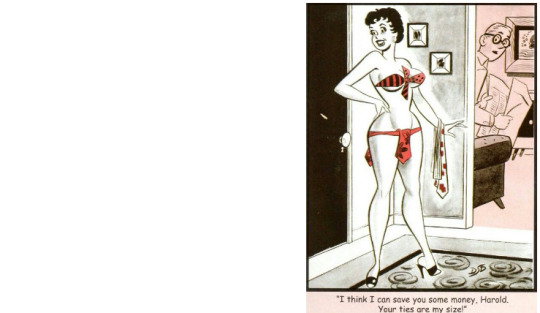
Decarlo's fashion sense is shown in at least one other illustration with multiple ties wrapped around a woman's bosom, interesting in that it is a couple tied falling from a bowtie.
#Archie Comics#Betty Cooper#Veronica Lodge#Harold#necktie#Are the boys coming in gowns for this party?#Turnabout Party#Bob Montana#Dan Decarlo#Humorama#It strikes me that the third character in the comic strip is a regular and has a name#Bob Montana universe not interacting with the comic books
14 notes
·
View notes
Text
SECRETARIAL SCHOOL
February 18, 1949

“Secretarial School” (aka “Liz Attends Claremont Business School”) is episode #31 of the radio series MY FAVORITE HUSBAND broadcast on February 18, 1949 on the CBS radio network.
Synopsis ~ George needs a new secretary, so Liz enrolls in secretarial school so she can fill the position.
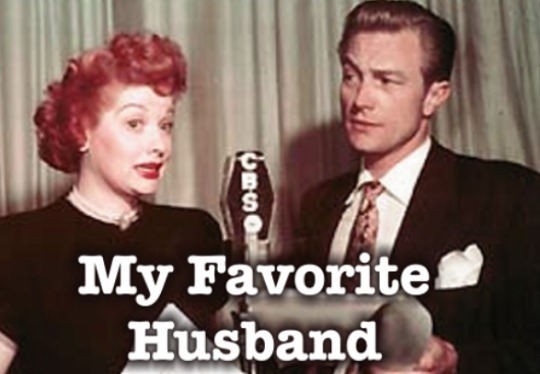
“My Favorite Husband” was based on the novels Mr. and Mrs. Cugat, the Record of a Happy Marriage (1940) and Outside Eden (1945) by Isabel Scott Rorick, which had previously been adapted into the film Are Husbands Necessary? (1942). “My Favorite Husband” was first broadcast as a one-time special on July 5, 1948. Lucille Ball and Lee Bowman played the characters of Liz and George Cugat, and a positive response to this broadcast convinced CBS to launch “My Favorite Husband” as a series. Bowman was not available Richard Denning was cast as George. On January 7, 1949, confusion with bandleader Xavier Cugat prompted a name change to Cooper. On this same episode Jell-O became its sponsor. A total of 124 episodes of the program aired from July 23, 1948 through March 31, 1951. After about ten episodes had been written, writers Fox and Davenport departed and three new writers took over – Bob Carroll, Jr., Madelyn Pugh, and head writer/producer Jess Oppenheimer. In March 1949 Gale Gordon took over the existing role of George’s boss, Rudolph Atterbury, and Bea Benadaret was added as his wife, Iris. CBS brought “My Favorite Husband” to television in 1953, starring Joan Caulfield and Barry Nelson as Liz and George Cooper. The television version ran two-and-a-half seasons, from September 1953 through December 1955, running concurrently with “I Love Lucy.” It was produced live at CBS Television City for most of its run, until switching to film for a truncated third season filmed (ironically) at Desilu and recasting Liz Cooper with Vanessa Brown.
REGULAR CAST
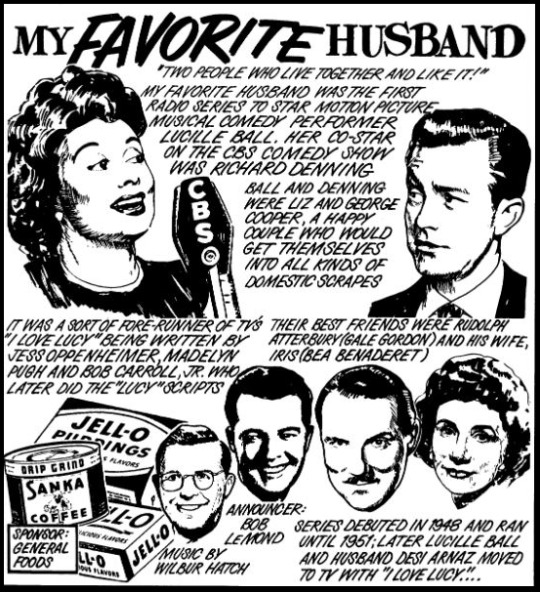
Lucille Ball (Liz Cooper / “Jenny Smith”) was born on August 6, 1911 in Jamestown, New York. She began her screen career in 1933 and was known in Hollywood as ‘Queen of the B’s’ due to her many appearances in ‘B’ movies. With Richard Denning, she starred in a radio program titled “My Favorite Husband” which eventually led to the creation of “I Love Lucy,” a television situation comedy in which she co-starred with her real-life husband, Latin bandleader Desi Arnaz. The program was phenomenally successful, allowing the couple to purchase what was once RKO Studios, re-naming it Desilu. When the show ended in 1960 (in an hour-long format known as “The Lucy-Desi Comedy Hour”) so did Lucy and Desi’s marriage. In 1962, hoping to keep Desilu financially solvent, Lucy returned to the sitcom format with “The Lucy Show,” which lasted six seasons. She followed that with a similar sitcom “Here’s Lucy” co-starring with her real-life children, Lucie and Desi Jr., as well as Gale Gordon, who had joined the cast of “The Lucy Show” during season two. Before her death in 1989, Lucy made one more attempt at a sitcom with “Life With Lucy,” also with Gordon.
Richard Denning (George Cooper) was born as Louis Albert Heindrich Denninger Jr., in Poughkeepsie, New York. When he was 18 months old, his family moved to Los Angeles. Plans called for him to take over his father’s garment manufacturing business, but he developed an interest in acting. Denning enlisted in the US Navy during World War II. He is best known for his roles in various science fiction and horror films of the 1950s. Although he teamed with Lucille Ball on radio in “My Favorite Husband,” the two never acted together on screen. While “I Love Lucy” was on the air, he was seen on another CBS TV series, “Mr. & Mrs. North.” From 1968 to 1980 he played the Governor on “Hawaii 5-0″, his final role. He died in 1998 at age 84.
Ruth Perrott (Katie, the Maid) was also later seen on “I Love Lucy.” She first played Mrs. Pomerantz (above right), a member of the surprise investigating committee for the Society Matrons League in “Pioneer Women” (ILL S1;E25), as one of the member of the Wednesday Afternoon Fine Arts League in “Lucy and Ethel Buy the Same Dress” (ILL S3;E3), and also played a nurse when “Lucy Goes to the Hospital” (ILL S2;E16). She died in 1996 at the age of 96.
Bob LeMond (Announcer) also served as the announcer for the pilot episode of “I Love Lucy”. When the long-lost pilot was finally discovered in 1990, a few moments of the opening narration were damaged and lost, so LeMond – fifty years later – recreated the narration for the CBS special and subsequent DVD release.
Gale Gordon and Bea Benadaret had not yet joined the cast in the roles of Rudolph and Iris Atterbury.
GUEST CAST
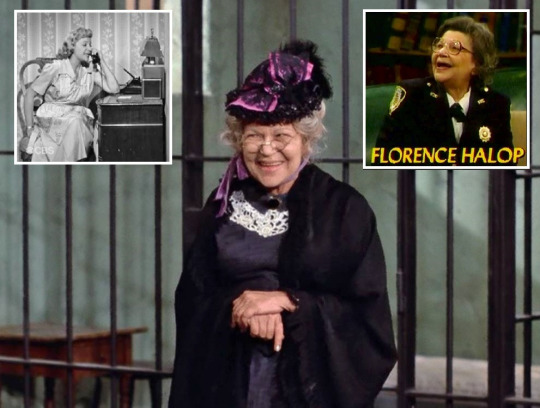
Florence Halop (Ruthie aka ”The Brooklyn Blabbermouth”) was first seen on television with Lucille Ball in “Redecorating” (ILL S2;E8) in which she reprised her role as the party line phone hog. She wouldn’t work for Lucy again until 1974, when she played a Little Old Lady on a Western-themed episode of “Here’s Lucy.” In 1985, she replaced Selma Diamond (who had died of lung cancer) as the bailiff on “Night Court.”
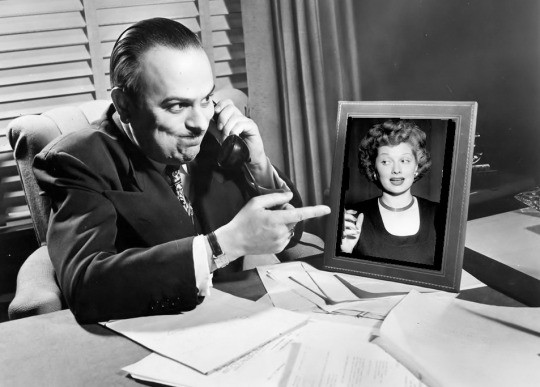
Frank Nelson (Mr. Allen, Bank Examiner) was born on May 6, 1911 (three months before Lucille Ball) in Colorado Springs, Colorado. He started working as a radio announcer at the age of 15. He later appeared on such popular radio shows as “The Great Gildersleeve,” “Burns and Allen,” and “Fibber McGee & Molly”. This is one of his 11 performances on “My Favorite Husband.” On “I Love Lucy” he holds the distinction of being the only actor to play two recurring roles: Freddie Fillmore and Ralph Ramsey, as well as six one-off characters, including the frazzled train conductor in “The Great Train Robbery” (ILL S5;E5), a character he repeated on “The Lucy Show.” Aside from Lucille Ball, Nelson is perhaps most associated with Jack Benny and was a fifteen-year regular on his radio and television programs.
The roles of Miss Claremont, the Blabbermouth’s Mother, and the Secretary on the Intercom are uncredited and unidentified, but were likely played by the same performer.
EPISODE
ANNOUNCER: “Now let’s look in on the Coopers. It’s early evening. Dinner is over. George is in the living room and Liz is helping Katie the Maid clear off the table.”
Liz is dreading talking to George about the right front fender on the car. When she finally goes into the living room she immediately confesses to the accident, even though he only wanted to talk to her about his life insurance policy. He’s doubled his policy so that she’ll get $10,000 if he should die.

In “Lucy Goes On Strike” (HL S1;E16) in 1969, Harry takes out a $100,000 double indemnity insurance policy on Lucy’s life with himself as sole beneficiary, which Lucy accidentally overhears.
Liz doesn’t want to talk about such things. She refuses to think about a life without George. She insists that there must be some dire reason for his doubling the policy. She even wonders if he’ll ever marry again should she die first. He explains his new double indemnity policy to her. If he dies by accident she will get double than if he passes away naturally.
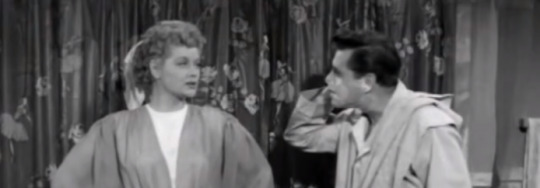
In “The Audition” (ILL S1;E6), Ricky sends Lucy to his lawyers to see about his will, which sends Lucy into a panic about him dying - and who would go first!
LIZ: “Well, I’m going to miss you, but when you feel yourself going, try to make it an accident, huh?”
Liz tells him not to worry about the money. She will get a job and take care of herself. George cannot even begin to think of Liz set loose in the workforce. She says that she is going to prove him wrong by getting a job right away.
Later, Liz returns from a day job hunting and is exhausted. She tells Katie she is determined to go to business school and learn shorthand. Their party line is tied up again by the “Brooklyn Blabbermouth” (Florence Halop).
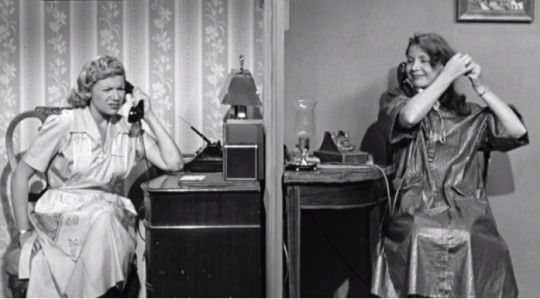
A party line was a local loop telephone circuit that is shared by multiple subscribers. Party lines provided no privacy and were frequently used as a source of entertainment and gossip. Objections about one party monopolizing a line were common and eavesdropping remained an ongoing concern. By the end of the 20th century, party lines had been phased out in the United States. Although we are never quite sure where Sheridan Falls is located, it would be unusual for a party line to exist outside its local area. Lucy Ricardo contends (and brilliantly dispenses) with a party line in “Redecorating” (ILL S2;E8, above, also starring Florence Halop, left).
The “Brooklyn Blabbermouth” calls Liz “Miss Big Ears” and explains she is talking to her mother. Liz is amazed she even has a mother.
BLABBERMOUTH: “Whaddya think? Someone built me with an Erector Set?” LIZ: “No. I thought you came in a box of Cracker Jack.”
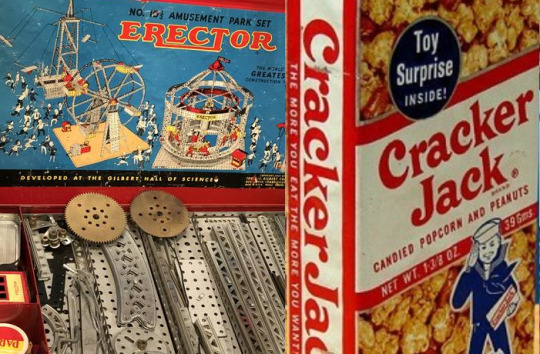
Erector Set was a brand of metal toy construction sets which were originally sold by the Mysto Manufacturing Company in 1913, a successor to wooden Lincoln Logs and a predecessor to plastic LEGO. This gag manages to get a very loud laugh and a round of applause from the “My Favorite Husband” studio audience.
Cracker Jack is a molasses-flavored caramel-coated popcorn and peanut confection first patented in 1896. It is famous for being packaged with an inexpensive novelty item (a ‘prize’) inside the box. Food historians say it may be America’s first ‘junk food.’ It was often the punch line on “I Love Lucy.”
Liz begs the Blabbermouth (whose name is Ruthie) to allow her to make a quick call. She is updating her mother about their radio serials since her radio is broken.
LIZ: “Do you have to use the telephone?” BLABBERMOUTH: “Whaddya expect me to use? A two-way wrist radio?”
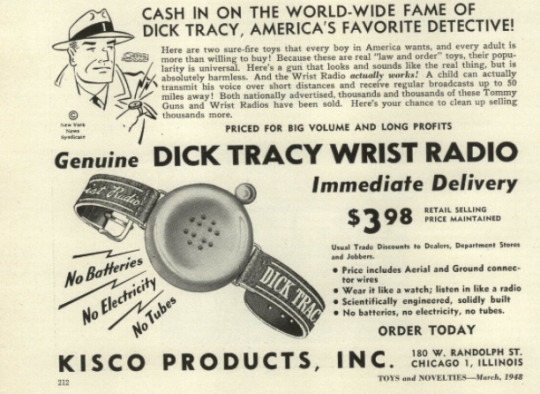
In 1946, Chester Gould’s ‘Dick Tracy’ comic strip introduced the idea that it’s detective hero could communicate through a two-way wrist radio. In 1948, that cartoon item was brought to reality, along with a myriad of other Dick Tracy-themed toys. The “Dick Tracy” radio series ran from 1934 to 1948. It then lived on in television and films.
The Blabbermouth ignores Liz’s request for telephone time and drones on about the plot of her mother’s favorite soap opera:
BLABBERMOUTH: “So mama, you remember how kindly Dr. Stevenson had to operate on Little Jimmy, who was run over by a truck, and he tried to save the life of blind Mr. Pat, who was on his way to get the doctor for grandma Smith, who broke her leg when she fell downstairs trying to help Mary Lou, who caught her hand in the ringer.” MAMA: “Oh, yeah. Which show was that?” LIZ: “’Life Can Be Beautiful’!”
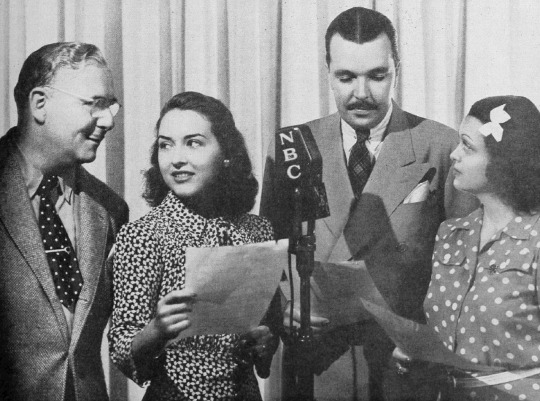
After the distressing plot line described, it seems unlikely, but there really was a radio soap opera named “Life Can Be Beautiful.” it premiered September 5, 1938 on NBC and moved two months later to CBS, where it was heard from November 7, 1938 to June 21, 1946. The final run was on NBC from 1946 to 1954.
Liz is furious and hangs up. She decides to go down to the secretarial school and enroll in person.
LIZ: “If I wait for her to get off the phone I won’t need a job, I’ll be collecting Social Security.”
The United States Social Security act was signed into law by President Franklin Roosevelt in 1935. The nation’s first Social Security card was issued in 1936 with benefits first paid out in 1940. Social Security was sometimes used as a punch line on Lucille Ball’s television programs, especially concerning age.
At the secretarial school Liz, and a gaggle of other women, are welcomed by Miss Claremont, the founder and head teacher.
MISS CLAREMONT: “When you finish our course, each of you will be completely equipped to get along with your future boss, as we teach you shorthand, typing, filing and jujitsu.”
Miss Claremont calls upon Liz to help demonstrate typing, but Liz says there are no letters on the keys. Miss Claremont explains that this is deliberate, in order to teach the touch system of typing.

Three weeks after this episode was broadcast, Lucille Ball began filming Miss Grant Takes Richmond, in which her character, Ellen Grant, went to the Woodruff Secretarial School and also had a great deal of trouble with her typewriter. The film was released later that year but Lucille Ball was seen typing in all of her television sitcoms.
Liz attempts to type her name:
LIZ: “Shake hands with Querty Uioop!”
Three weeks later, Miss Claremont is chastising Liz for her non-traditional shorthand. It seems drawing a little cabbage is not satisfactory shorthand for money.
LIZ: “That’s lettuce.”
Liz brags that her typing has improved to 60 words a minute. Miss Claremont says it doesn’t count if you type the same word over and over.
At home, Liz tries to romance George out his distracted mood. When he sees her school notebook he asks about her shorthand. She’s written her shopping list in shorthand.
GEORGE: “What does this one mean: the number three, a dog, and a daisy?” LIZ: “That’s to remind me to get three heads of cauliflower.”
GEORGE: “What’s this dilly: a telescope, a doctor, and a child?” LIZ: “I want to get something in the newspaper. That means watch out for the Examiner boy.”
GEORGE: “Here’s one I can understand: a man throwing books in the air. Juggling the books, eh?” LIZ: “Just a little jug.”
GEORGE: “Now explain this last shorthand mystery to me: a circle, a ship, and laundry ticket.” LIZ: “That’s the title of a phonograph record I want to buy - 'A Slow Boat To China'.”
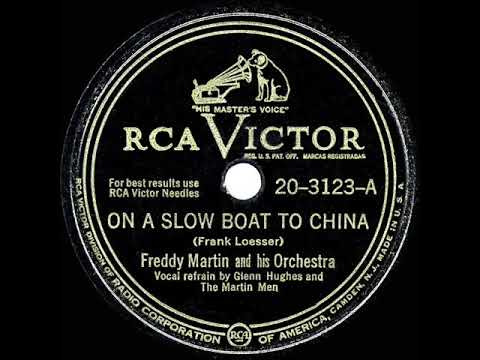
"On A Slow Boat to China" is a popular song by Frank Loesser, published in 1948. The enigmatic title was a well-known phrase among poker players, referring to a person who lost steadily and handsomely. In October and November 1948, it was recorded by no less than five artists: Kay Kyser, Freddy Martin, Benny Goodman, Art Lund, and Larry Clinton.
George is distracted because there’s a bank examiner at work and his secretary is out sick. Liz wants to get into the act - literally - by becoming his substitute secretary, but George says no way! He has already arranged with the Claremont Secretarial School to send someone over. Once he goes to bed, Liz makes the decision to call the school and cancel the secretary - taking the job for herself!

On “I Love Lucy” Lucy Ricardo went to elaborate lengths to work with her husband, sometimes even resorting to kidnapping!
Later, Liz enters the living room wearing a black wig and horned rim spectacles. Katie, who doesn’t recognize her on first glance, reminds her to phone and cancel the other secretary. Naturally, Blabbermouth is on the party line, talking to her mother about soaps. She refers to Liz as “Nosey Rosie”.
BLABBERMOUTH (to Mama): “Their son, the radio actor, comes in and wants to borrow ten bucks until television blows over...”
The idea that television was just a passing fad and not a serious threat to radio was common. The motion picture industry also felt threatened by television. In hindsight, they were correct. Had it not be for television, Lucille Ball would have remained Queen of B movies and you would not be reading this right now!
Liz angrily hangs up.
LIZ: “How do you like that; a filibuster!” KATIE: “Filibuster?” LIZ: “Yeah. I’ve had my fill and I’d like to bust her.”
Liz decides to go down to the corner drug store to make the call. Katie reminds her to put on her dress first!
Later, Liz arrives at George’s office in disguise.
[As the scene opens, the voice of a sectary on the intercom announces the arrival of the new secretary. In a rare flub, Richard Denning jumps her line, momentarily talking over her.]
Liz is flustered and doesn’t even know her own name. It seems she hasn’t yet made one up!
GEORGE: “Well, how about sitting down?” LIZ: “No. That sounds too much like an Indian. How about Jenny Smith? Yeah, Jenny Smith.”
While in disguise, Liz decides to test George’s fidelity by flirting with him. Unbeknownst to Liz, George is on to her. He unmasks her pretty quickly.

This test of marital fidelity was also tried by Lucy Ricardo while also wearing a black wig. Just like George, Ricky is on to her games and plays along for a bit.
She breaks it to him that she’s canceled the other secretary. Since it is too late to get anyone else, he allows it. He dictates some responses she needs to type for him to read to the Bank Examiner. At the meeting with the Bank Examiner, Liz is still pretending to be Miss Smith. Mr. Allen, the Bank Examiner (Frank Nelson), asks George a question and George consults his notes - only to find a jumble of nonsensical typing. Liz was using the touch system and her fingers were on the wrong keys! Since Liz is the only one who can read her original shorthand notes, she must answer for him.
MR. ALLEN: “What’s the collateral for this ten million dollars?” LIZ (reading): “Three heads of cauliflower”.
MR. ALLEN: “When the amount of collateral is not commensurate with the size of the loan what is your procedure?” LIZ (reading): “Juggle the books.”
MR. ALLEN: “When Mr. Cooper found out there was to be an investigation, what instructions did he give the employees?” LIZ (reading): “Watch out for the Examiner, boy.”
MR. ALLEN: “What would have done if you had gotten away with it?” LIZ (reading): “Get a slow boat to China.”
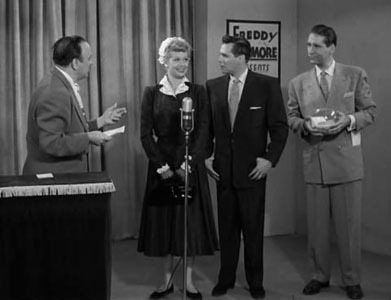
The exchange of transposed questions and inadvertently humorous answers will be explored again in “Lucy Gets Ricky on the Radio” (ILL S1;E32) which also featured Frank Nelson asking the questions!
Later at home, George says that it took six hours to prove to Mr. Allen that Liz was responsible for the whole misunderstanding. Liz promises that she’ll stop looking for a job and call the secretarial school and quit. She picks up the phone to call but...
BLABBERMOUTH: “And the doctor said ‘Ma Perkins’ you’ll never walk again.”
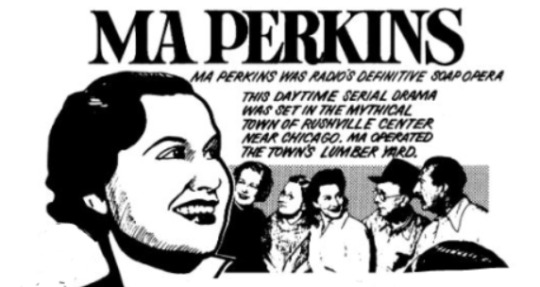
“Ma Perkins” was a radio soap opera heard on NBC from 1933 to 1949 and on CBS from 1942 to 1960. Between 1942 and 1949, the show was heard simultaneously on both networks.
Liz insists that she told the phone company to change her party line. The Blabbermouth says that they did - they changed it to her mother’s! Liz faints.
END of EPISODE
#My Favorite Husband#I Love Lucy#Lucille Ball#Ma Perkins#Richard Denning#Secretarial School#Miss Grant Takes Richmond#Ruth Perrott#Frank Nelson#Florence Halop#Party Line#Life Can Be Beautiful#On A Slow Boat To China#Radio#CBS#Dick Tracy#Cracker Jack#Erector Set#Bob LeMond
1 note
·
View note
Text
Pauly Shore: Eyewitness to Comedy History
Brash, nasal and opinionated, Mitzi Shore took a middling comedy club on the Sunset Strip and for a time made it the center of American comedy. That was the Comedy Store, which she won ownership of in her 1974 divorce. Before she died in 2018, the Comedy Store launched the careers of a bevy of stand-up comics, including David Letterman, Jay Leno, Jimmie Walker, Elayne Boosler and Sandra Bernhard.
Watching them all was her son, Pauly Shore. He gained notoriety as “the Weasel,” a lewd surfer character, and became a popular V.J. on MTV before appearing in 1990s movies like “Encino Man” and “Bio-Dome.” Today, at 51, he’s still a working stand-up and has begun performing a one-man show about his childhood called “Stick With the Dancing.” Backstage after a recent performance in Myrtle Beach, S.C., he shifted out of his Weasel persona and remembered his childhood as an eyewitness to the greatest minds in comedy. Looking back on that scene of the ’70s, ’80s and ’90s, he spoke about his mother’s influence — and the breakthroughs and feuds that surrounded her. Here are excerpts:
Mitzi Shore as a Force of Nature
My mom was very loving — but her first love was always the Store and the comics. She owned a limo — a weird-looking limo. Riding in it, I felt like we were the Addams Family. But Mom loved being driven around. She always had comedians drive the limo.
Hiding in the Lighting Booth
Around age 8, Pauly Shore became fascinated with stand-up and spent as much time as he could at the Store, hiding in the lighting booth to watch stars like Redd Foxx and George Carlin and little-known talents like Lenny Schultz.
Lenny Schultz was a P.E. coach with a beautiful body, but he was nuts. He would bring food onstage and say, “The Lenny Schultz diet, what I like to do is put food on the parts of my body where I want to lose weight.”
Then he would strip down to a Speedo and stick handfuls of cottage cheese inside the Speedo. He’d pour milk on his head, rub a grapefruit on his elbow, and smear chocolate pudding on his chest. My little jaw dropped. After a performance, he’d go out to the parking lot to clean up. My first job at the Comedy Store was hosing down Lenny Schultz.
House Calls From Robin Williams
None of the club’s regulars hit it bigger than Williams, who parlayed his sets there into television and film stardom.
Robin Williams was a really sweet guy, but he would run around the club like the Tasmanian Devil. For a while, my mom’s office was at our house. Right after Robin got the “Mork & Mindy” TV show, he’d show up at our house to meet with my mom, wearing the Mork outfit.
Comedians are very sensitive. My mom knew that, and she was like the den mother to all of them. She knew how fragile Robin was, and they had this kindness for each other that was pretty special.
The Gentle Richard Pryor
Pryor rebooted his career at the Comedy Store in the 1970s.
My mom was very close with Richard Pryor — she took him under her wing. I know they had sex one time, but their relationship wasn’t a sex thing, it was a love-intimacy-respect thing.
When Richard showed up at the Store, it was like a wave went through the club: “Richard’s here, oh my God, Richard’s here.” I’d go out to the parking lot and open the door of his car. He’d get out, say “Heeeeey little man!” and shake my hand. He wasn’t socially awkward, the way most comedians are offstage; he was gentle and soft.
Once he got inside the club, I’d fetch him a Courvoisier, he’d light a cigarette, and my mom would sit next to him on a staircase. When the M.C. would announce Richard, people reacted like Jesus Christ was coming onstage. He would get a laugh as soon as he spoke, no matter what he said.
Richard came around whenever he was developing a new standup set; Paul Mooney, who wrote with him, and Jennifer Pryor, his wife, would sit in the back and take notes. And Richard would be terrible at the beginning — the audience would worship him, but he’d do five minutes with no laughs. He’d keep working at it, and it’d get a little better, but still be pretty bad. Then I’d go away for a little while, maybe a month at summer camp, and when I came back he’d be doing 40 minutes and killing.
Mondays at the Club
That was “potluck” night, with performance times determined by drawing names from a hat. Some aspiring comics would spend months performing on Mondays, gaining experience and trying to get in Mitzi Shore’s good graces.
Garry Shandling did over 20 showcases for my mom before she gave him a prime-time slot. She believed in him — if she didn’t, she wouldn’t have let him hang around — but she pushed him really hard. He was a writer and she thought he didn’t have it as a performer yet.
Same thing with Roseanne — my mom told her to wear overalls. To this day, I think Roseanne got her cadences from my mom. Roseanne kind of worshiped her.
Hollywood had the casting couch and the Comedy Store had the Mitzi couch: if you wanted a spot onstage, you needed to kiss the owner’s ass. But when my mom liked you, she would make you a doorman. You could park cars. “You’re great. Now go answer the phones.” You’d be on the payroll, getting comfortable in this crazy environment.
Yakov Smirnoff worked as the handyman at the Store — and at our house. He needed a job, and he was a carpenter. He sanded our doors and built a butler’s pantry.
Late Nights Offstage
Sometimes after the Store closed for the evening, a handful of comics would go to Mitzi Shore’s home.
My mom had afterparties at our house, but I was a light sleeper. From the third grade through junior high, I would wake up in the middle of the night and everyone would be in the living room: Mom, Richard Belzer, Robin Williams, Richard Pryor, David Tyree, other randoms. She’d bring champagne from the Store and there’d be lots of joints.
I’d open the door to a smoke-filled room and say: “Mom. Mom. Mom!”
Then she’d notice me. “What? Oh, hey, Pauly.”
“Mom, I’ve got school in the morning, please.”
Everyone would just stare. They apologized, but the second I left the room, they would start laughing.
Comics on the Picket Line
After Johnny Carson moved “The Tonight Show” from New York to California in 1972, aspiring comics in Los Angeles had a clear career path that involved attracting the attention of Carson’s bookers (who frequented the Comedy Store). However, the comedians weren’t paid for their sets.
My mom saw her role as giving comics a space to develop, but it was obvious she was making a lot of money. The comics wanted to get paid, too. So in 1979, they went on strike.
Mom took it really personally. It was embarrassing to have all these comics out in front with picket signs. They had messages like “No Bucks for Yucks.”
It was hard. One comedian, Steve Lubetkin, killed himself, jumping off the roof of the Hyatt House, landing on the ramp between the Hyatt and the Store. “My name is Steve Lubetkin,” his suicide note read. “I used to work at the Comedy Store.”
The [striking comics] ended up making a deal and got paid a token amount. My mom never really forgave the comedians, but pretty soon the drugs were flowing and people were partying again and everybody seemed to forget about it.
Mitzi Shore expanded the club over the years, but Pauly Shore discovered that if he wanted a stand-up career of his own, he would need to leave.
When I got into high school, I wanted a 100-gallon saltwater fish tank. Mom said she wouldn’t buy it for me, but that I could work for it — she made me the short-order cook on weekends at the Westwood branch of the Comedy Store.
My mom used the Westwood branch for comedians she thought weren’t ready for the Sunset location: Howie Mandel, Paul Rodriguez, Arsenio Hall. Jim Carrey did these amazing impressions of Elvis Presley and Henry Fonda.
Budd Friedman owned the Improv, and there was a feud — comics had to play one club or the other. It was awkward, because me and Budd’s kid went to Beverly Hills High School together. I used to go into the Improv, write down the names of the comedians working there and tell my mom.
My mom also had this tense situation with Rodney Dangerfield. In 1985, he hosted HBO’s annual “Young Comedians Special” — and Rodney recruited them all from the Comedy Store.
My mom didn’t like that he was poaching her comics — but they wanted to be poached! Roseanne did the show, Andrew Dice Clay did it. Sam Kinison had been working as a doorman at the Store, but the spot he did on Rodney’s special made him famous.
Mom banned Sam from the Store because of an incident where he showed up all coked out with a gun, looking for somebody he had beef with. I was hanging out with Sam a lot and she thought I was going to die. We had this intense fight where she told me not to spend time with Sam. I said, “Mom, you don’t understand. I’m not hanging out with him for drugs — I’m hanging out with him because he’s a genius.”
She started crying and threw her keys at me. The next day, I got my own studio apartment and started my stand-up career without her.
from WordPress https://mastcomm.com/entertainment/pauly-shore-eyewitness-to-comedy-history/
0 notes